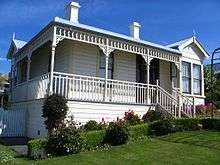James Fletcher (industrialist)
Sir James Fletcher (29 March 1886 – 12 August 1974) was a New Zealand industrialist who founded Fletcher Construction, one of the country's largest firms. His son, Sir James Fletcher Junior, continued to build the corporation.
Early life
Fletcher was born at Kirkintilloch, Scotland, and was educated in Glasgow. He was the sixth of thirteen children.[1] James worked for a time as a chemist’s assistant before being apprenticed as a carpenter. After pneumonia prevented him from moving to Canada as he originally had planned, he migrated instead to Dunedin, New Zealand, in 1908.[2] He donated New Zealand Marble to the town of Kirkintilloch in 1925 to construct a War Memorial which stands today at the entrance to the town's Peel Park.
Fletcher Construction

In 1908 he established a building business with his brother William John, known as Fletcher Brothers. In 1916, his brother John emigrated to Dunedin and joined the company,[3] and the partnership was formed as a limited liability company, and from 1919 was called the Fletcher Construction Company. In 1940, the company was renamed Fletcher Holdings. Fletcher moved the businesses headquarters to Auckland in 1925. The company grew despite the difficult economic conditions, completing a number of major construction projects, such as the Chateau Tongariro and Dominion Museum in 1929.
Following the election of the First Labour Government in 1935, Fletcher established an enduring friendship with the government. Fletchers' built some of the first state houses in New Zealand.[1]
Fletcher was seconded by the government in 1942. His second eldest son, also called James, took over the running of Fletcher Holdings at this time.[1] Throughout the Second World War he held several positions, first as Commissioner of Defence Construction, then Superintendent of Military Works, and later Controller of Shipping.[4]
Fletcher had many other business interests, including the Imperial Chemical Industries (ICI), the Tasman Pulp and Paper Company, and New Zealand Paper Mills. Fletcher Senior was knighted in the 1946 New Year Honours.[5][6]
See also
- James Muir Cameron Fletcher
- Hugh Fletcher
- Fletcher Construction
- Fletcher Challenge
Notes
- "University of Auckland Business History Project - Fletcher Challenge". University of Auckland. Retrieved 2007-08-31.
- Taonga, New Zealand Ministry for Culture and Heritage Te Manatu. "Fletcher, James". teara.govt.nz. Retrieved 2019-11-11.
- Scholefield, Guy, ed. (1940). A Dictionary of New Zealand Biography : A–L (PDF). I. Wellington: Department of Internal Affairs. p. 267. Retrieved 6 October 2013.
- Goldsmith 2009, p. ?.
- New Zealand Encyclopaedia, 1966. "Fletcher, Sir James". Te Ara: The Encyclopedia of New Zealand. Retrieved 2007-08-31.
- "No. 37410". The London Gazette (Supplement). 28 December 1945. p. 157.
References
- Goldsmith, Paul (2009). Fletchers: A Centennial History of Fletcher Building (hardback). Auckland: Davia Ling Publishing. ISBN 978-1-877378-35-5.CS1 maint: ref=harv (link)
- Smith, Jack (2009). No Job Too Big: A History of Fletcher Construction, Volume I: 1909–1940 (hardback). Wellington: Steele Roberts. ISBN 978-1-877448-69-0.CS1 maint: ref=harv (link)